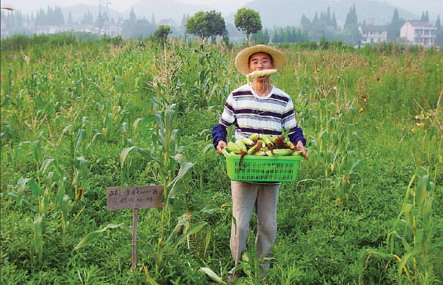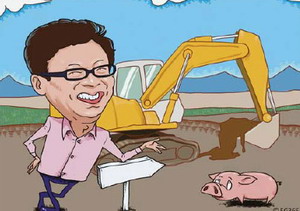Economy
Food safety concerns drive Chinese back to the farm
By Xu Junqian (China Daily)
Updated: 2011-05-02 10:30
 |
Large Medium Small |
Farming is not just for peasants. It's become a trend even among those with cushier backgrounds, as Xu Junqian reports from Shanghai.
|
 |
|
You are what you eat: Former-executive-turned-organic-farmer Shen Huiqiang proudly shows his naturally-grown corn from his own field. [Photos/China Daily] |
To say that Shen Huiqiang, a former real estate executive, is passionate about organic farming would be a gross understatement. Three years ago, the 32-year-old Zhejiang native quit a 200,000-yuan-a-year job in Beijing to return to his hometown, where he put his entire 400,000-yuan-in-savings into a new home for him and his wife and parents, and a 40,000-square-meter farm he leased from local farmers. Shen had decided to live off the land.
When a son was born last year, Shen and his wife decided that they would give the child nothing but a natural diet. Everything the child ate would come from their own field or from some other trustworthy source that, as far as they knew, was entirely free from chemicals, additives or "unnatural ingredients".
At the same time, Shen's wife was thinking about finding a "naturally-raised" girl as a future wife for the 20-month-old boy, to "preserve the fine lines" of their family.
That marriage obsession with a child that young might sound a bit far-fetched, but their concerns about food safety were anything but strange or new.
In fact, there has been no shortage of people - from the famous to the ordinary - thinking about establishing farms and eateries that grow or provide safe, organic food, especially in light of the spate of food scandals, like the poison pork in Henan province or the steamed buns in Shanghai.
|
 |
|
Ding Lei, founder and CEO of NetEase, has plans for a modern pig farm back in his hometown in Zhejiang province. [Photo/CFP] |
But why would NetEase itself want to diversify by getting into, of all things, the pig business? Well, Ding is personally concerned about food safety. It all started during a casual dinner at a hotpot restaurant in Chongqing in 2008, when Ding was shocked at the sight of the color of the pig blood used in a dish that was a delicacy back home. The unusual appearance aroused his suspicions about how the pigs had been raised.
Meanwhile, in Shanghai, four women working in the same office, all of them mothers, have put all of their leisure time and savings into an organic farm in a village near Shanghai, which provides the produce that feeds their families and the families of hundreds of other working mothers.
And, over in Wenzhou, Zhejiang province, home to many self-made millionaires and daring entrepreneurs, agriculture - the very foundation of China's economy for centuries, at least until the reforms of 1980 - is making a comeback as the darling of many industrial pioneers.
City government statistics show that, during 2010, Wenzhou had more than 500 manufacturers who had put a total of 6 billion yuan into agriculture. It is widely believed that growing food safety concerns might create a growing demand for "green" produce selling at a premium price at supermarkets around the country.
|
||||
"It struck me like a thunder bolt. I was planning to get married at that time and I didn't want to lose anyone dear to me because of tainted food."
Then, one evening as he was driving home through Beijing's heavy traffic, he thought about his rustic roots back at the family farm and made up his mind right then and there: "I wanted to raise my family in the security of my own village."
His parents were of a different mind. They had retired and objected vigorously to the idea of his returning, arguing that they had spent their life savings sending him to university so that he could find a decent job in the city - certainly not to come back and labor at the farm. They simply could not understand why he wanted to give up what he had fought so hard to get.
"I knew it'd be tough. We don't have government support or sufficient capital. We're doing it all by ourselves," he said.
And he lost his vegetables a few times to pests, but he steadfastly refused to give in to pesticides: "It's organic or nothing at all."
| 分享按钮 |



